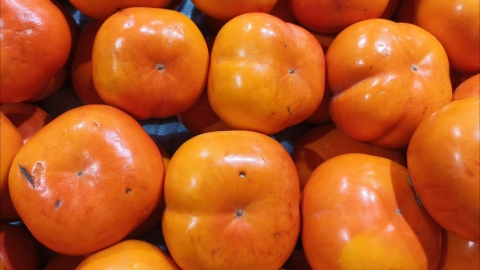What Foods Should Not Be Eaten with Persimmons?
Generally, when eating persimmons, one should avoid consuming high-protein foods, high-calcium foods, strongly acidic foods, gas-producing foods such as sweet potatoes, alcoholic beverages, etc., as eating these together with persimmons may cause gastrointestinal discomfort or affect nutrient absorption. The detailed analysis is as follows:

1. High-protein foods: Such as crab, fish, shrimp, and eggs, which are rich in protein. Tannic acid in persimmons can combine with the protein in these foods to form precipitates that are difficult to digest, possibly causing gastrointestinal discomfort symptoms such as bloating, abdominal pain, and nausea.
2. High-calcium foods: Such as milk, cheese, tofu, and dried shrimp skins, which are high in calcium. Tannic acid in persimmons can react with calcium to form calcium tannate, which not only affects calcium absorption but may also form stone-like substances in the gastrointestinal tract, increasing the burden on the stomach and intestines.
3. Strongly acidic foods: Such as hawthorn, lemon, vinegar, and pickled vegetables, which are high in acidity. These foods stimulate gastric acid secretion, and under acidic conditions, tannic acid in persimmons is more likely to combine with other substances, increasing precipitate formation, which may lead to stomach discomfort.
4. Gas-producing foods such as sweet potatoes: Such as sweet potatoes, purple sweet potatoes, and legumes, which tend to produce gas in the gastrointestinal tract. Gas accumulation may cause intestinal and stomach bloating. Eating persimmons at this time increases the likelihood of tannic acid combining with food residue, potentially causing bloating or indigestion.
5. Alcoholic beverages: Such as white spirits, beer, and red wine, alcohol irritates the gastric mucosa and accelerates gastric acid secretion. At the same time, alcohol promotes the absorption of tannic acid in persimmons. Consuming both together may intensify the irritation of tannic acid on the gastrointestinal tract, increasing the risk of discomfort.
In daily life, in addition to paying attention to the dietary combination of persimmons, one should also control the amount of persimmons consumed and avoid eating them on an empty stomach. Choose persimmons that are highly ripe and have low tannic acid content. Maintaining regular eating habits and avoiding overeating can also help maintain gastrointestinal health.








